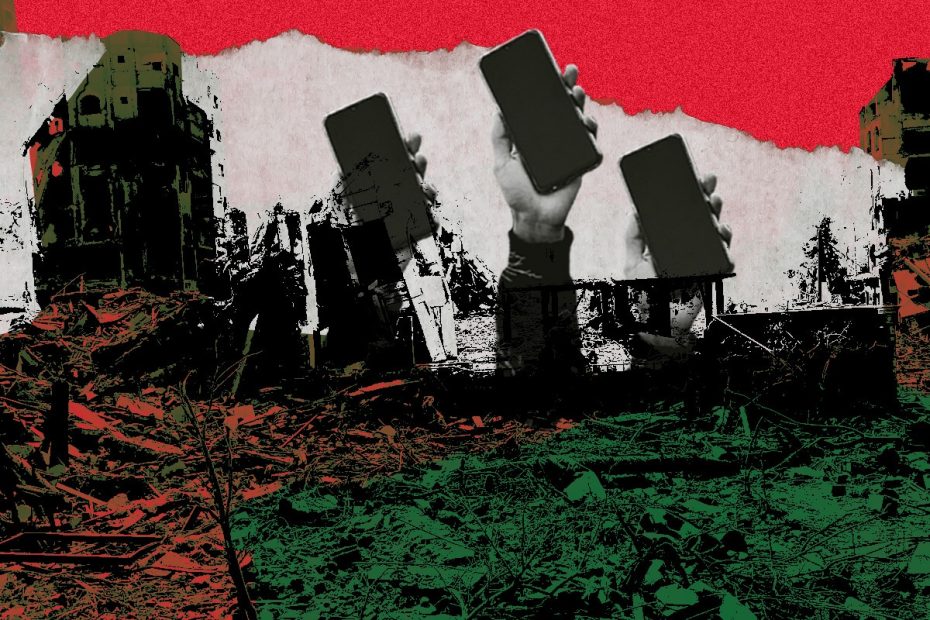Content note: The following post contains references to violence and war.
This statement is written and issued in collaboration with AccessNow.
On October 27, as Israel prepared to launch a ground invasion into the Gaza Strip, unprecedented heavy bombardment severed the last remaining, already limited and intermittent, lines of communication, cutting the people of Gaza off from each other, from emergency assistance, and from the world. With civilian deaths mounting, we urge the entire international community to push for an immediate physical and digital ceasefire and pressure Israel to restore communications access. We further call on Egyptian authorities and internet service providers operating in the area to urgently extend telecommunications access to the people in Gaza.
Since Israel imposed a complete siege on Gaza on October 9, telecommunications and internet access has been severely limited, resulting in a near-complete information blackout, alongside shortages of water, food, electricity, fuel, and medicine. According to the UN, Israeli airstrikes “targeted several telecommunication installations, destroying two of the three main lines for mobile communication.” Two additional providers (Netstream and NewStarMAX) came offline amid the barrage of airstrikes on October 27, leaving 11 internet service providers operating in Gaza now completely shut down due to infrastructural damage.
As a result of this blackout, residents of Gaza are no longer able to access emergency services. Tedros Adhanom Ghebreyesus, Director General of the World Health Organization, reports that the WHO has “lost touch with our staff in Gaza, with health facilities, health workers and the rest of our humanitarian partners on the ground.” Gaza’s main emergency service provider, the Palestinian Red Crescent, shared, “We have completely lost contact with the operations room in Gaza Strip and all our teams operating there due to the Israeli authorities cutting off all landline, cellular and internet communications.” Other organizations that report having lost contact with their teams in Gaza include UNICEF, Medicins Sans Frontiers, Medical Aid for Palestinians, Action Aid, and Islamic Relief.
In addition to emergency services, newsrooms have been left in the dark. A number of international and regional media outlets, including the Washington Post, report having lost all connection to their correspondents on the ground. This will only exacerbate the unprecedented amount of mis- and disinformation spreading on social media and traditional media platforms, and allow Israel to continue perpetrating war crimes and human rights abuses with impunity. The UN relief agency in Palestine (UNRWA) reports that 53 of its staff have been killed since October 7, while at least 29 journalists have been killed reporting from Gaza.
Disrupting internet access and deliberately targeting critical civilian infrastructure, including telecommunications, as a collective punishment or retaliation is a human rights violation forbidden by customary international humanitarian law and international humanitarian law regulating military occupation. This now-total communications blackout leaves Palestinians, in Gaza and beyond, in the dark, unable to access life-saving information or stay in touch with loved ones. It also exacerbates other human rights and international humanitarian law violations, including the intentional targeting of civilians. It restricts the documentation of serious human rights abuses and war crimes, which is protected under international human rights law. This enables perpetrators to commit abuses with impunity and suppresses the evidence of journalists, human rights defenders, and ordinary citizens that is essential for ongoing or future international investigations.
According to International Criminal Court jurisprudence, widespread, intentional disruptions and the targeting of journalists may constitute reasonable grounds to believe that there is a State policy designed at the highest level of authority aimed at achieving its objectives at any cost and covering up eventual abuses by its forces. This would qualify any attempted or concrete serious breach of humanitarian law during the disruptions as a crime against humanity and thus subject to universal jurisdiction, giving any nation the authority to hold the perpetrators accountable.
Given the staggering civilian death toll and the unfolding humanitarian crisis, we call for the immediate restoration of internet connectivity in Gaza and an end to the targeting of civilian telecommunications infrastructure.
We further call on Egypt to unilaterally increase its mobile networks coverage further into southern Gaza, and provide unfettered emergency telephony and internet services to Gaza phone subscribers at local cost or for no cost, which is possible under Egypt’s current telecom regulation framework.
We call on the international community to take all necessary steps to support the immediate restoration of telecommunications, electricity, and other essential services in Gaza and any other affected areas, and to ensure that international and humanitarian law are respected.


